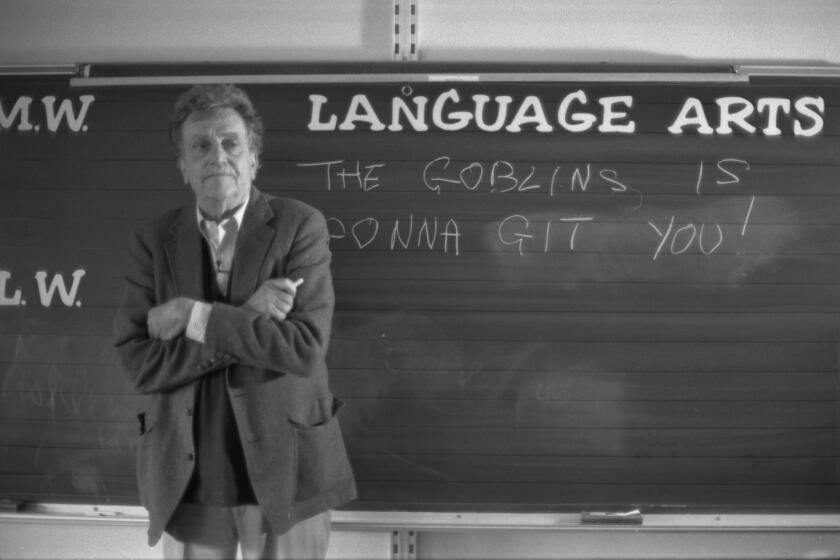A Word, Please: Are you longing to lounge on a chaise longue?

- Share via
One of my favorite summer activities is relaxing on a chaise longue under an umbrella with a good book. It’s a nice escape from the grueling work of changing “chaise lounge” to “chaise longue” in article after article this time of year — and wondering why I bother.
A “chaise longue” is, of course, one of those long lounge chairs you see situated around swimming pools, as well as indoor furniture in a similar shape. The term comes from the French “chaise,” meaning “chair,” and “longue,” which is the French feminine form of “long.” But because these chairs are for lounging and because Americans are less familiar with the French spelling, we English speakers often use “chaise lounge.”
This process of transforming foreign or less familiar words into something familiar is called “folk etymology” — like “duck tape” formed from “duct tape,” both of which are correct today.
But it would be a mistake to assume that “chaise lounge” came from “chaise longue” through this exact process. In fact, “chaise lounge” is almost as well established in English as “chaise longue.” The English spelling started showing up in dictionaries in the 1920s, just a decade or two after dictionaries started including the French term, which we used to hyphenate: chaise-longue.
But even before that, English speakers were using “lounge” to mean a type of chair, for example in this passage from the 1852 novel “Uncle Tom’s Cabin”: “He stretched himself at full length on a lounge opposite Marie.”
So we didn’t get this sense of “lounge” simply by rearranging the letters in “longue.”
Even more interesting: “chaise longue” and “chaise lounge” have sort of carved out their own roles over the years.
The maligned punctuation mark many editors reject outright isn’t entirely without purpose, but it’s often used unnecessarily.
“The American ‘chaise lounge’ began to appear in print in the 1920s; undoubtedly it had been used in speech for some time earlier,” writes Merriam-Webster’s Dictionary of English Usage. “As a printed term, it seems to have become established first in the trade; many of our early citations are from manufacturers’ catalogs and newspaper advertisements. When the spelling began to appear in both the Montgomery Ward and the Sears and Roebuck catalogs, it could no longer be ignored.”
As “chaise lounge” was staking out its place in the business world, “chaise longue” became dominant in literature. Surprisingly, it still is. According to Google’s Ngram Viewer, “chaise longue” is about 50% more common in published works than “chaise lounge.”
Editors like me could be the reason. At some point early in my editing career, I got it in my head that “chaise longue” was correct and “chaise lounge” was wrong. I’m not sure where I got that idea. Checking old editions of the Associated Press Stylebook going back to 1993, I can’t find any mention of “chaise longue” or “chaise lounge.” My older editions of the Chicago Manual of Style don’t mention it, either. So I suspect the misunderstanding was passed down to me from senior editors, who I suspect got the idea from dictionaries based on the particular way editors use these reference books.
When a layperson uses a dictionary and sees a term has multiple correct spellings, like ambience and ambiance, they can pick their preference. Editors, however, have a policy to ensure everyone’s on the same page: Use whichever form the dictionary indicates is preferred or more standard. For example, when you look up “ambience” in Merriam-Webster’s Collegiate Dictionary, it cites “ambiance” as a “variant.” And when you look up “ambiance,” you’re redirected to “ambience.” These are clear indications that the dictionary believes the E spelling is better.
The two dictionaries used most by editors, Merriam’s and Webster’s New World College Dictionary, both treat “chaise lounge” as a variant of, and therefore inferior to, “chaise longue.” So for news and book editors, “chaise lounge” is wrong even though, for you, either form is fine.
June Casagrande is the author of “The Joy of Syntax: A Simple Guide to All the Grammar You Know You Should Know.” She can be reached at JuneTCN@aol.com.
All the latest on Orange County from Orange County.
Get our free TimesOC newsletter.
You may occasionally receive promotional content from the Daily Pilot.






